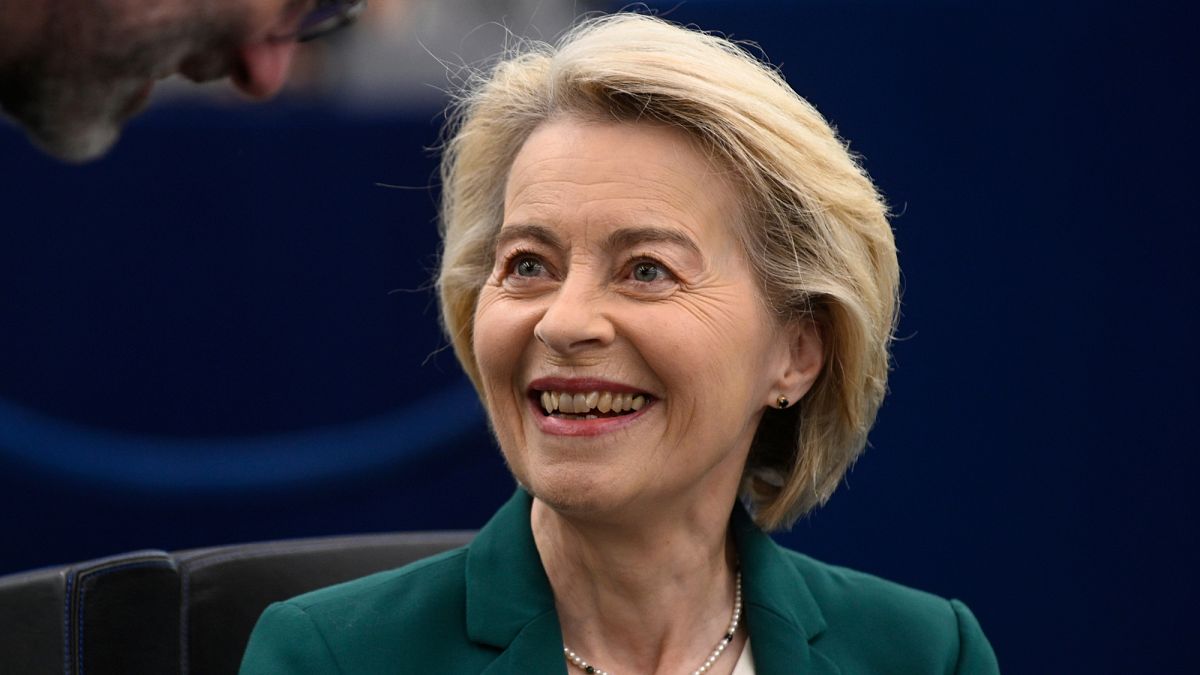As the European Parliament prepares to vote on a motion of censure against European Commission President Ursula von der Leyen, the political fallout could be significant – regardless of the outcome, with the motion reigniting concerns about her leadership style, lack of transparency and political positioning.
The motion was tabled by Romanian MEP Gheorghe Piperea and signed by 77 members from the right-wing political groups, including the European Conservatives and Reformists (ECR), Patriots for Europe, and the Europe of Sovereign Nations. At the heart of their criticism lies von der Leyen’s opaque handling of the EU’s Pfizer vaccine procurement and her increasingly centralised approach to power.
Alberto Alemanno, Jean Monnet Professor of EU Law at HEC Paris, told Euronews that the motion’s significance goes well beyond the numbers in Parliament, however.
“This motion of censure highlights many of the shortcomings that media and political observers have pointed out for some time—her presidential style, the centralisation of power, and her opacity,” Alemanno said.
He argued that while von der Leyen will likely retain the support of a majority of MEPs, the damage to her public image and political standing will be lasting.
“More and more citizens will ask themselves: is she really the right person to lead the EU in such turbulent times—negotiating with a potential Trump administration or playing a key role in Russia-Ukraine peace talks?”
Alemanno also noted that concerns about von der Leyen’s leadership are not limited to the far-right. Her secretive handling of vaccine negotiations and unwillingness to engage with the media have drawn criticism across the political spectrum.
“This censure motion is acting as a lightning rod for broader frustration,” he added. “It brings together complaints from multiple camps and highlights a growing desire for greater democratic accountability.”
A senior European Commission official, speaking on condition of anonymity, said the vote had been widely discussed within the Berlaymont headquarters.
“Officials see this as a warning. Her leadership style—extremely centralised and often politically ambiguous—has made her vulnerable. There’s a sense she’s become a prisoner of her own European People’s Party (EPP),” the official said.
Time for von der Leyen to realign her agenda, says MEP
Von der Leyen and the centre-right EPP have faced criticism in recent months for accepting far-right support in several parliamentary decisions, breaking with the EU’s traditional centrist coalitions involving socialists, liberals, and greens.
One EPP decision-maker told Euronews that von der Leyen must now realign her agenda more clearly with the party’s values.
“She should draw the consequences. An EPP-dominated Commission must better reflect the EPP’s platform,” the source said.
Dutch Green MEP Bas Eickhout suggested the damage from this episode could extend beyond von der Leyen herself.
“What’s clear is that the centrist majority in Parliament isn’t functioning well—and that reflects poorly not only on von der Leyen, but on Manfred Weber too,” said Eickhout. “In terms of public image, Weber may have suffered even more.”
Despite the motion’s expected failure, political observers believe it will intensify scrutiny of von der Leyen’s leadership and further limit her room to manoeuvre in a second term.
“She won’t walk away strengthened,” Alemanno concluded. “Even if the vote fails, the pressure to hold her accountable will only grow.”
This will put her on the spot as debate turns from next week to the European budget, “which is expected to be very contentious within and among member states of the union”, he said.
“Up to now, up to this vote, von der Leyen could rely on both majorities based on political convenience,” he says, referring to the traditional centrist platform on the one hand, and tie-ups with the right wing on the other.
By the time of von der Leyen’s State of the Union address to the Parliament in September, she will be constrained to pick one of the two that she can rely on, he said.

